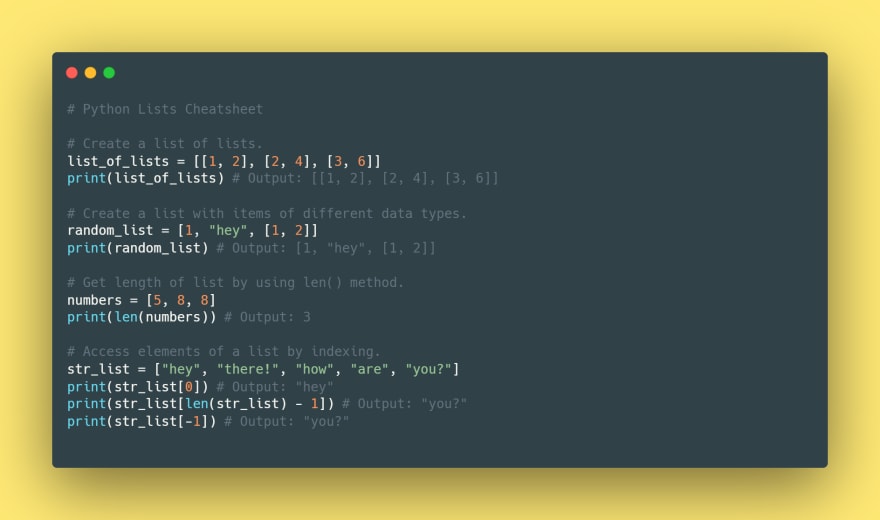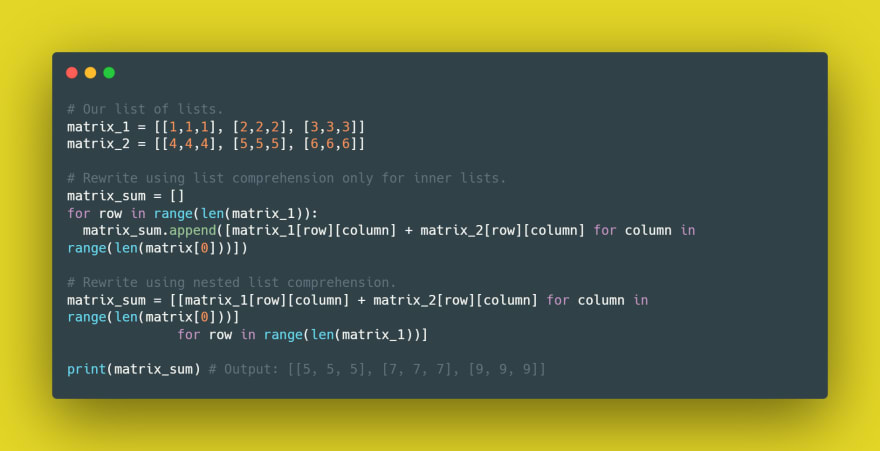An Interest In:
Web News this Week
- April 26, 2024
- April 25, 2024
- April 24, 2024
- April 23, 2024
- April 22, 2024
- April 21, 2024
- April 20, 2024
February 14, 2022 05:43 pm GMT
Original Link: https://dev.to/codewithkenn/python-lists-cheat-sheet-developer-resources-8hl
Python Lists Cheat Sheet - Developer Resources
Hey, there!
This is Kenn, Your Daily Advocate from CodeWithKenn!
Welcome to the Blog! Make yourself at home!
In this article, we won't talk much. For a couple of days, I've been thinking about a way of making my content easier and shorter so that Developers won't have to spend so much time scrolling; I want this Blog a Place of Resources and Discovery, not a Boring Blog.
What are Python Lists?
Today, we're gonna get one of the first resources, Python Lists Easy Cheatsheet.
Python Lists are used to store an ordered collection of items, which might be of different types but usually they aren't.
Cheatsheet Content
Step 1
Snippet - Image
Snippet - Code
# Create an empty list using square brackets.numbers = []print(numbers) # Output: []# Create an empty list using list().numbers = list()print(numbers) # Output: []# Create a list of numbers.numbers = [1, 2, 3]print(numbers) # Output: [1, 2, 3]# Create a list of numbers in a range.numbers = list(range(1, 4))print(numbers) # Output: [1, 2, 3]# Create a list of tuples.tuples_list = [(1, 2), (2, 4), (3, 6)]print(tuples_list) # Output: [(1, 2), (2, 4), (3, 6)]Step 2
Snippet - Image
Snippet - Code
# Create a list of lists.list_of_lists = [[1, 2], [2, 4], [3, 6]]print(list_of_lists) # Output: [[1, 2], [2, 4], [3, 6]]# Create a list with items of different data types.random_list = [1, "hey", [1, 2]]print(random_list) # Output: [1, "hey", [1, 2]]# Get length of list by using len() method.numbers = [5, 8, 8]print(len(numbers)) # Output: 3# Access elements of a list by indexing.str_list = ["hey", "there!", "how", "are", "you?"]print(str_list[0]) # Output: "hey"print(str_list[len(str_list) - 1]) # Output: "you?"print(str_list[-1]) # Output: "you?"Step 3
Snippet - Image
Snippet - Code
# Slicing a list.str_list = ["hey", "there!", "how", "are", "you?"]print(str_list[2:]) # Output: ["how", "are", "you?"]print(str_list[:2]) # Output: ["hey", "there!"]print(str_list[-3:]) # Output: ["how", "are", "you?"]print(str_list[:-3]) # Output: ["hey", "there!"]print(str_list[1:4]) # Output: ["there!", "how", "are"]# Get a copy of list by slicing.print(str_list[:]) # Output: ["hey", "there!", "how", "are", "you?"]Step 4
Snippet - Image
Snippet - Code
# Append to a list.numbers = [1, 2]print(numbers) # Output: [1, 2]numbers.append(3)print(numbers) # Output: [1, 2, 3]# Concatenate lists.numbers = [1, 2]strings = ["Hey", "there"]print(numbers + strings) # Output: [1, 2, "Hey", "there"]Step 5
Snippet - Image
Snippet - Code
# Mutate a list, that is, change its contents.numbers = [1, 2, 3]numbers[0] = 100print(numbers) # Output: [100, 2, 3]numbers[0:2] = [300, 400]print(numbers) # Output: [300, 400, 3]numbers[1:3] = []print(numbers) # Output: [300]numbers[:] = []print(numbers) # Output: []# Insert item to a list.greeting = ["how", "you?"]greeting.insert(1, "are")print(greeting) # Output: ["how", "are", "you?"]Step 6
Snippet - Image
Snippet - Code
# Our list of lists.matrix_1 = [[1,1,1], [2,2,2], [3,3,3]]matrix_2 = [[4,4,4], [5,5,5], [6,6,6]]# Matrix addition with for loop.# Assuming that the matrices are of the same dimensionsmatrix_sum = []for row in range(len(matrix_1)): matrix_sum.append([]) for column in range(len(matrix[0])): matrix_sum[row].append(matrix_1[row][column] + matrix_2[row][column])Step 7
Snippet - Image
Snippet - Code
# Our list of lists.matrix_1 = [[1,1,1], [2,2,2], [3,3,3]]matrix_2 = [[4,4,4], [5,5,5], [6,6,6]]# Rewrite using list comprehension only for inner lists.matrix_sum = []for row in range(len(matrix_1)): matrix_sum.append([matrix_1[row][column] + matrix_2[row][column] for column in range(len(matrix[0]))])# Rewrite using nested list comprehension.matrix_sum = [[matrix_1[row][column] + matrix_2[row][column] for column in range(len(matrix[0]))] for row in range(len(matrix_1))]print(matrix_sum) # Output: [[5, 5, 5], [7, 7, 7], [9, 9, 9]]Credit - Cheat Sheet
All the Credit goes to @ShyamaSankar
Before Leaving
Want to start blogging? Join NOW!
Original Link: https://dev.to/codewithkenn/python-lists-cheat-sheet-developer-resources-8hl
Share this article:
Tweet

View Full Article
Dev To
 An online community for sharing and discovering great ideas, having debates, and making friends
An online community for sharing and discovering great ideas, having debates, and making friendsMore About this Source Visit Dev To










